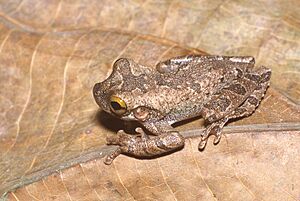Buckley's slender-legged treefrog facts for kids
Quick facts for kids Buckley's slender-legged treefrog |
|
|---|---|
 |
|
| Conservation status | |
| Scientific classification |
|
| Kingdom: | Animalia |
| Phylum: | Chordata |
| Class: | Amphibia |
| Order: | Anura |
| Family: | Hylidae |
| Genus: | Osteocephalus |
| Species: |
O. buckleyi
|
| Binomial name | |
| Osteocephalus buckleyi (Boulenger, 1882)
|
|
| Script error: The function "autoWithCaption" does not exist. | |
| Synonyms | |
|
Hyla buckleyi Boulenger, 1882 |
|
Script error: No such module "Check for conflicting parameters".
Osteocephalus buckleyi, also known as Buckley's slender-legged treefrog, is a type of frog. It belongs to the Hylidae family, which includes many treefrogs. This frog lives around the edges of the Amazon Basin. You can find it in countries like Bolivia, Peru, Ecuador, Colombia, and parts of Brazil. It also lives in Venezuela, Guyana, Suriname, and French Guiana. Scientists think this might actually be a group of very similar frog species. Some experts believe that Osteocephalus vilmae, found in Ecuador and Peru, is its own separate species.
Contents
What's in a Name?
The name buckleyi was given to honor Clarence Buckley. He was a collector who worked in Ecuador in the 1880s. He gathered the first group of these frogs that scientists studied.
What Does It Look Like?
These frogs are not very big. Male frogs are usually about 3.8 to 4.5 centimeters long. Females are a bit larger, measuring about 4 to 5.1 centimeters from their snout to their rear end. Their backs are pale green and have dark blotches. Sometimes, they have a yellow or brownish stripe down the middle of their back.
Skin and Head Features
The sides of their bodies can be cream-colored or light brown. These areas often have darker spots, some almost black. Male frogs have bumpy skin on their backs. These bumps are small and large, with tiny hard points. Female frogs have much fewer and more spread-out bumps. Their heads are almost as wide as they are long. The front of their snout looks flat. Their finger pads are wide, which helps them climb.
Where Do They Live?
Buckley's slender-legged treefrogs live in rainforests. They prefer old forests, newer forests that have grown back, and the edges of forest areas. They are found in places below 700 meters (about 2,300 feet) above sea level. In Colombia, they can be found a bit higher, up to 1,660 meters (about 5,450 feet).
Reproduction and Threats
These frogs lay their eggs in small, permanent water bodies. This includes streams and small forest rivers called igarapés. Sadly, their homes can be destroyed by habitat loss. This means their forest homes are cut down or changed, which can threaten them in some areas.
 | Mary Eliza Mahoney |
 | Susie King Taylor |
 | Ida Gray |
 | Eliza Ann Grier |


